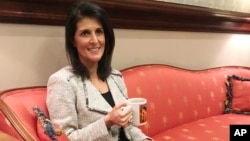South Carolina Gov. Nikki Haley says dealing with lawmakers and serving as the state's healer-in-chief through deadly natural disasters, a shooting massacre and other crises have equipped her for the role of United Nations ambassador.
“Everything I've done leading up to this point has always been about diplomacy,” the conservative Republican told reporters Monday. “It's been about trying to lift up everyone — getting them to work together for the greater good — and that's what I'm going to attempt to do going forward.”
The South Carolina-born daughter of Indian immigrants, Haley at 38 became the nation's youngest governor in January 2011 and was easily re-elected in 2014. She turns 45 on Inauguration Day, two days before Senate confirmation hearings begin on her nomination by President-elect Donald Trump.
Always speaks her mind
Though known nationally as a conciliator, Haley's relationship with South Carolina's GOP-controlled legislature has been more contentious than congenial over her tenure.
For one, she's never shied from publicly bashing those she disagrees with. Amid a 2015 debate on road funding, she told a group of real estate agents to “take a good shower” after leaving the Statehouse, prompting House Speaker Jay Lucas to declare people expect better of their public officials, “not middle school insults that serve no purpose.”
And like Trump, she frequently uses social media to criticize. She defended his Twitter use against those who call that un-presidential, adding “I understand why he does it.”
“They said that wasn't a way I should be governor,” she said of her Facebook posts, noting those helped her even to derail a bid by lawmakers to budget themselves a pay raise. “Anything happening in the state, that was my way of communicating with the public.”
Enjoys national spotlight
While Haley lacks foreign policy credentials, she can communicate, wooing business to her state by lobbying corporations and foreign governments. She also relishes the national spotlight, having addressed the Republican National Convention in 2012 and delivered the GOP response to President Barack Obama's last State of the Union address in 2016 — with some feisty jabs. Also in 2012, she promoted a memoir with a national book tour — and glamour shots in Vogue magazine.
Yet if confirmed, Haley will leave the governorship at perhaps the pinnacle, term-limited with two years left — and likely rocky ones at that.
While Haley appeared in line to become chairman of the Republican Governors Association her final year in office, the agenda of an increasingly lame duck governor was likely to be ignored by state lawmakers.
Legacy is leadership
Last year, she made a largely unsuccessful push to defeat GOP legislators she opposes and lost a key state Senate ally she did endorse. Her political group spent more than $1 million in the anti-incumbent effort, but Haley's targets are now leading the state Senate's two most powerful committees and the chamber itself.
At home, her legacy centers largely on her leadership in ousting the Confederate flag from Statehouse grounds after a June 2015 massacre at a historic black church in Charleston. Dylann Roof, the white gunman sentenced to death Tuesday, could be seen in photos brandishing the rebel flag. Instead of sparking the race war Roof wanted, the killing of nine blacks kindled consensus that the divisive symbol had to go.
Haley said the shooting made her realize that where many saw a flag symbolizing ancestors' sacrifices in the Civil War, many others saw a symbol of hate.
“South Carolinians had the chance to put themselves in other people's shoes, and they had a chance to see there was a hurtful symbol that had been hijacked by a murderer,” she said Monday. “We moved forward.”
Didn't always agree with Trump
Haley also led South Carolina through a white police officer's shooting of a black motorist, captured on dramatic cellphone video. No riots followed, even after the officer's murder trial deadlocked. A retrial is planned. Haley also led through devastating 2015 floods and Hurricane Matthew's 2016 landfall.
“Being able to hold people together and ... remind them of what we're capable of — those are all things you realize over time make you stronger and make you wiser,'' she said. “So I don't know what it takes to be U.N. ambassador. I know that I will do everything I need to make sure I make the people of this country proud.”
Haley had her own public spats with Trump during the primaries. But she said both freely speak their minds and she gladly accepted the U.N. post when offered.
“Whenever I saw something wrong, I called him out on it just like I do everybody else,” she said. “He knows that I'll speak my peace, and he speaks his peace, so we have a respect about each other. Above all things, when the president-elect calls and asks you to serve your country, you don't say no to that."





